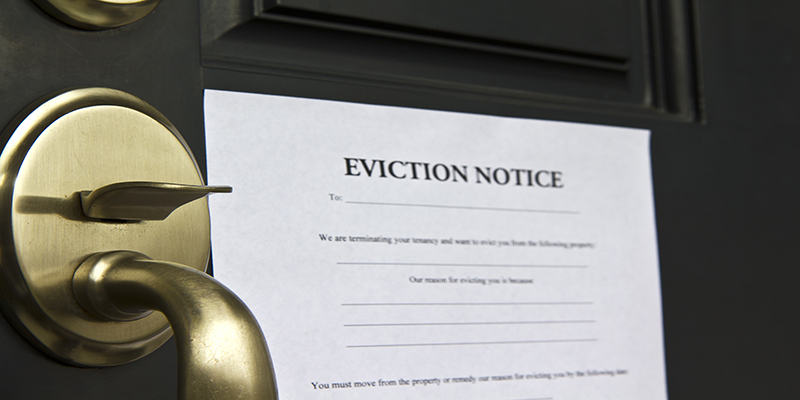Tenant eviction is a normal part of managing a rental property. But, as a landlord, you need to know when you can legally evict a tenant. This way, you can complete the process in a seamless and efficient manner without breaking any laws.
How to Evict a Tenant the Right Way
Eviction is not a one-step process that takes effect as soon as you decide to push a tenant out. Although an eviction lawsuit is one of the quickest civil cases anyone can go through — typically taking place over the span of just a few weeks — it is not something you can start without the right reasons. There are many moving parts involved, and you need to be able to terminate the tenancy first.
Check Your State Laws
 Tenancy termination does not just happen in a blink of an eye. As a landlord, you must give your tenant written notice of termination.
Tenancy termination does not just happen in a blink of an eye. As a landlord, you must give your tenant written notice of termination.
The notice period is not fixed and usually depends on state statutes. Not all states have the same laws about termination notice periods, so you must check your state laws to see what applies to you.
You also need to abide by the rental or lease agreement you and your tenant signed. Most lease agreements dictate how long in advance landlords must give tenants notice of termination, provided they do not conflict with state laws.
Following termination, most tenants either just pack up and leave as told or settle the reason for termination. However, some stubborn or bold tenants might refuse to leave or settle the issue. When that happens, you can then file a lawsuit to evict the tenant. This is called an unlawful detainer lawsuit, otherwise known as UD.
The Three Types of Termination Notices
It is important to stress that termination laws differ from state to state. Each state has its own set of protocols when it comes to writing and serving termination notices as well as eviction papers. Therefore, if you intend to send a termination notice to your tenant, you must check your state and local regulations to avoid legal trouble.
Additionally, termination notices can vary depending on the situation. That said, there are three basic types of tenancy termination notices you must know about. These notices apply only to situations wherein a tenant misbehaves, giving landlords just cause to terminate and evict.
Though the terms may not be the same across all the states, here are the three types of termination notices:
1. Pay Rent or Quit
The most common reason landlords terminate tenancies is due to unpaid rent. Although tenant screenings can give you a general idea of a potential tenant’s behavior, bad tenants sometimes slip through the cracks.
When a tenant has missed paying rent, you can send them a Pay Rent or Quit Notice. This gives tenants an ultimatum to either settle their overdue rent or move out. In most states, such as California, the time given to tenants to clear their debt ranges from 3 to 5 days.
It is worth noting that not all states require landlords to allow tenants time to pay their rent. As such, if you would rather terminate tenancy than giving your tenant the chance to settle their overdue rent, you can use the Unconditional Quit Notice (explained below) instead.
2. Cure or Quit
Lease agreements exist to maintain order and express which responsibilities both tenants and landlords must fulfill. Terms usually include pet policies, noise policies, and the like. When a tenant violates a term in your lease agreement, you can send them a Cure or Quit Notice.
Just like the Pay Rent or Quit Notice, the Cure or Quit Notice gives tenants a chance to right their wrong within a set amount of time. If your tenant refuses or fails to remedy the violation, they must either move out or face eviction.
Some states are friendlier to tenants and have laws requiring landlords to give tenants an opportunity to correct their violations. In states where such laws do not exist, landlords have the option to terminate tenancy unconditionally.
3. Unconditional Quit
The Unconditional Quit Notice is the most severe type of termination notice. It does not give tenants a chance to settle their overdue rent or fix a lease violation. A majority of states, though, only allow this type of notice provided the tenant has committed one of the following:
- Missed the rent deadline more than once
- Violated a significant term or clause in the lease agreement repeatedly
- Caused serious damage to the property
- Taken part in or performed illicit acts such as dealing drugs
Evicting a Tenant Without Cause
Typically, landlords have no right to terminate the tenancy without just cause, especially when operating on a fixed-term lease. However, landlords can send tenants a 30-day or 60-day Notice to Vacate without just cause. This usually only applies to month-to-month tenancies, though. Moreover, this type of termination is only allowed in a handful of places. Most cities require just cause to evict a tenant.
Possible Defenses Against Eviction
 Some tenants will put up a fight when faced with eviction either because they believe they are right or simply in an attempt to have the case dismissed. This can prolong the eviction process and cost you more money in the end.
Some tenants will put up a fight when faced with eviction either because they believe they are right or simply in an attempt to have the case dismissed. This can prolong the eviction process and cost you more money in the end.
Tenants can identify mistakes in written notices or claim that you delivered them improperly. Your tenant can also claim that you violated the tenant’s legal rights, such as failing to provide a habitable home. This might justify the tenant’s misbehavior or turn the focus away from the issue. If you want to win your unlawful detainer lawsuit, you must be prepared for anything.
Dealing With the Aftermath
If everything goes well, you can win the lawsuit and successfully evict bad tenants. They usually have anywhere from 48 hours to a week, depending on state laws, to evacuate the unit. Though, it does not necessarily end there.
If your tenant still refuses to leave the premises even after you win the case, do not resort to self-help. It is illegal in every state to take such matters into your own hands, even if the tenant squats or deals damage to your property.
You cannot physically remove the tenant or their belongings from the unit. You also cannot change the locks on the door or lock the tenant outside. It is also unlawful to turn off essential utilities or harass the tenant in any way, shape, or form.
What you can do, though, is to seek help from law enforcement. Go to the sheriff’s department and show them the court judgment. The sheriff or marshal will then allow the tenant a set amount of time to clear the premises. If they still refuse to do so, the sheriff or marshal will be the one to physically remove the tenant.
A Necessary Part of Being a Landlord
As much as you would like to, it is impossible to have model tenants all the time. Once in a while, you will come across a bad tenant who always misses rent or breaks lease terms.
Sometimes, no matter how uncomfortable it makes you feel, you have no choice but to evict a tenant. When that time comes, remember to act within the law. If you need more help navigating the often-confusing laws on eviction, look for a property management company using our online directory. Search by zip code or city to find the best company near you.
RELATED ARTICLES:
- What Are The Legal Liabilities Of Property Managers
- Water Damage In Apartments: Who’s Responsible For Fixing It?
- 15 Key Questions To Ask A Landlord Before Renting




 Company
Company